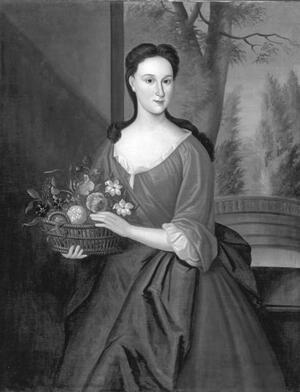Colonial Jewish mother instructs her son to eat "bread and butter"
The 35 surviving letters written, between 1733 and 1748, by Abigail Levy Franks to her son Naphtali in London offer rare access to the lives and concerns of colonial American Jews. On July 9, 1733, she offered Naphtali close instructions on his religious conduct, admonishing him to "be more Circumspect in the Observance of some things, Especialy y[ou]r morning Dev[otio]ns." She also warns him against eating anything but bread and butter at the London home of her brother, Asher, "nor noe where Else where there is the Least doubt of things not done after our Strict Judiacall [Jewish/kosher] method."
Napthali moved to London from New York at age 16 in order to seek out better business (and presumably marriage) prospects than those available in the new world. His mother's letters from New York highlight how personal and kinship connections helped to maintain a network of Jewish merchant families around the Atlantic world. Moreover, the letters yield valuable insights on New York politics and society, illustrate the ways in which Jews were able to enter into colonial American society, and reflect the strains and challenges of maintaining a distinctive Jewish identity in that setting.
Abigail's letters attest to the challenges of finding acceptance while maintaining distinctiveness. As indicated in the July 9th and other letters, she wondered about the rationale for some Jewish practices ("wathever my thoughts may be Concerning Some Fables"), but she remained committed to their observance ("this and Some other foundementalls I Look Open the Observence Conscientioussly, and therefore with my blessing I Strictly injoin it to your care."). Her letters demonstrate the extent of her family's integration into non-Jewish New York society and culture, but also reveal the painful costs of acceptance. Abigail's most emotional letter (June 7, 1743) conveys the depth of her anguish upon learning that her daughter, Phila, had secretly wed Oliver Delancey, who came from a prosperous non-Jewish family. There is no indication that Abigail ever saw Phila again.
Abigail's despair over her daughter's wedding indicates the value she placed on Jewishness. The attachment to Judaism of her husband, Jacob Franks, may be inferred from his leading role in New York's Shearith Israel congregation. Yet, ultimately, their story points to the tenuousness of Jewish identity for acculturated colonial Jewish families. Historians are fond of pointing out that none of Abigail Franks' grandchildren remained Jewish. None of her children who remained in America married Jews. And although her sons who moved to England, Napthali and Moses, both married Jewish women, their children married non-Jews.
Sources: Leo Hershkowitz and Isidore S. Meyer, eds., Letters of the Franks Family, 1733-1748, (Waltham, MA, 1968); Edith B. Gelles, ed., The Letters of Abigaill Levy Franks, 1733-1748 (New Haven: Yale University Press, 2004). The June 7, 1743 letter from Abigail to Naphtali can be seen at www.loc.gov/exhibits/haventohome/haven-haven.html.



